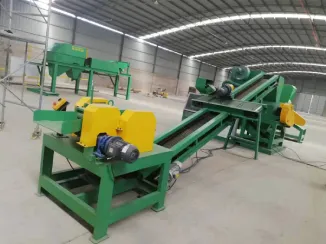

মে . 09, 2025 16:14 Back to list

(industrial trash shredder)
Contemporary manufacturing and disposal facilities process 18-22 tons of non-recyclable materials hourly, requiring equipment that combines raw power with precision. Industrial trash shredders have become indispensable for reducing landfill dependency, with 73% of waste management companies reporting ≥40% operational cost reduction after implementation. These systems handle composite materials, rubber remnants, and production rejects that compactors cannot process effectively.
Advanced shredding technology delivers measurable performance improvements:
Recent field tests demonstrate 0.3% downtime rates for shredders equipped with predictive maintenance sensors, compared to 6.8% in conventional units.
| Feature | Single-Shaft | Twin-Shaft | Granulators |
|---|---|---|---|
| Material Size Output | 100-150mm | 30-50mm | 5-15mm |
| Torque Output | 18,000 Nm | 42,000 Nm | 6,500 Nm |
| Noise Level | 82 dB(A) | 78 dB(A) | 74 dB(A) |
Leading suppliers differentiate through engineering specialization:
Third-party evaluations show 22% higher mean-time-between-failures for manufacturers using hardened steel (60-62 HRC) versus standard alloy components.
Modular designs enable adaptation to unique processing requirements:
Aerospace contractors achieved 91% material homogeneity using customized blade configurations, compared to 76% with standard setups.
Verified operational results from diverse sectors:
Procurement teams should prioritize machines with:
Post-installation audits reveal proper shredder selection improves ROI by 19-24 months compared to industry-standard 28-36 month payback periods.

(industrial trash shredder)
A: An industrial trash shredder is designed to break down large volumes of waste materials, such as plastics, metals, and organic debris, into smaller pieces. It helps reduce landfill waste and supports recycling processes. These machines are commonly used in manufacturing, construction, and waste management industries.
A: Yes, compact versions like mini industrial shredders are available for smaller-scale operations or limited spaces. They offer similar functionalities to larger models but with reduced capacity. Many manufacturers and suppliers list them online for purchase.
A: Look for manufacturers with certifications, positive customer reviews, and a proven track record in producing durable equipment. Ensure they provide warranties, maintenance support, and customization options. Comparing technical specifications and industry compliance is also crucial.
A: Industrial trash shredders can process diverse materials, including wood, textiles, rubber, and electronic waste. Specific models may specialize in heavy-duty materials like metal or hazardous substances. Always check the machine’s capabilities against your waste type.
A: Key factors include shredding capacity, material type, power source (electric, hydraulic), and space requirements. Budget, maintenance costs, and compliance with environmental regulations should also guide your decision. Consulting manufacturers for tailored solutions is advisable.
Latest news
The Future of Metal Recycling: Revolutionizing Waste Management
NewsMay.14,2025
Optimizing Waste with Recycling Lines
NewsMay.14,2025
Municipal Solid Waste Sorting Line: Revolutionizing Waste Management
NewsMay.14,2025
Metal Shredders: Essential Tools for Efficient Recycling
NewsMay.14,2025
Maximize Your Profits with a Copper Wire Granulator
NewsMay.14,2025
Home Metal Shredder: A Smart Choice for Your Home Recycling Needs
NewsMay.14,2025